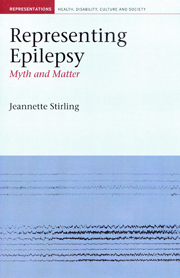Crossref Citations
This Book has been
cited by the following publications. This list is generated based on data provided by Crossref.
Larner, A. J.
and
Gardner-Thorpe, C.
2012.
Robert Lawson (?1846–1896).
Journal of Neurology,
Vol. 259,
Issue. 4,
p.
792.
2013.
Neuropsychological Neurology.
p.
97.
Thomas, Sanjeev V.
and
Nair, Aparna
2013.
Epilepsy in Women.
p.
11.
Lekka, Vasia
2015.
The Neurological Emergence of Epilepsy.
Vol. 305,
Issue. ,
p.
113.
Murray, Stuart
2017.
The Cambridge Companion to Literature and Disability.
p.
90.
Wheatley, Edward
2017.
The Cambridge Companion to Literature and Disability.
p.
17.
Barker, Clare
2017.
The Cambridge Companion to Literature and Disability.
p.
104.
Barker, Clare
and
Murray, Stuart
2017.
The Cambridge Companion to Literature and Disability.
Jarman, Michelle
2017.
The Cambridge Companion to Literature and Disability.
p.
155.
Joshua, Essaka
2017.
The Cambridge Companion to Literature and Disability.
p.
47.
Schalk, Sami
2017.
The Cambridge Companion to Literature and Disability.
p.
170.
2017.
The Cambridge Companion to Literature and Disability.
p.
255.
McRuer, Robert
2017.
The Cambridge Companion to Literature and Disability.
p.
139.
Hobgood, Allison P.
and
Wood, David Houston
2017.
The Cambridge Companion to Literature and Disability.
p.
32.
Barker, Clare
and
Murray, Stuart
2017.
The Cambridge Companion to Literature and Disability.
p.
1.
Kafer, Alison
and
Kim, Eunjung
2017.
The Cambridge Companion to Literature and Disability.
p.
123.
2017.
The Cambridge Companion to Literature and Disability.
p.
xiii.
Davidson, Michael
2017.
The Cambridge Companion to Literature and Disability.
p.
74.
Sezer, Burak
2022.
The Empowering Paradox of “1 = 2.” Mark Z. Danielewski’s Arithmopoetics.
Orbit: A Journal of American Literature,
Vol. 10,
Issue. 2,
Jancovic, Marek
2022.
The Palgrave Handbook of Violence in Film and Media.
p.
207.



